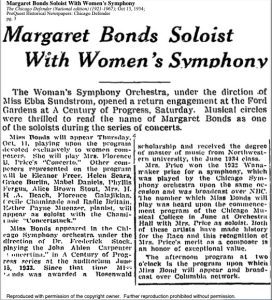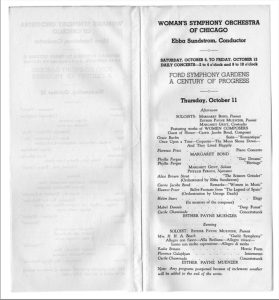Women supporting women can be a powerful thing. Whenever I see examples of this phenomenon, I usually smile to some degree. For this week’s blog post, I found a newspaper clipping from the Chicago Defender celebrating a historic occurrence of women supporting each other. “Margaret Bonds Soloist With Women’s Symphony” describes a program featuring Margaret Bonds and the music of many women composers, including Florence Price. Performing Price’s “Concerto,” we can see a warm welcoming of both of these women’s artistry to the Chicago area. Sometimes I forget how intertwined the careers of these prominent musicians truly were.
Even though this blurb is small, the journalist manages to pack a lot of information in a limited amount of space. The Woman’s Symphony Orchestra, directed by Ebba Sundstrom, will feature a long program featuring the music of these women: Eleanor Freer, Helen Sears, Grace Burlin, Mabel Daniels, Phyllis Fergus, Alice Brown Stout, Amy Beach, Florence Galaikian, Cecile Chaminade and Radie Britain.
(Before encountering this article, I had only heard of three of these women, not including Bonds and Price. Therefore, I spiraled a bit in my accompanying research and found a variety of reference entries in case others would like to explore more prominent women musicians of the early 20th century.)
This program must have been a momentous occasion to experience a night where all of these intelligent women were celebrated. I include a program below of the concert and a recording of the piece featuring Margaret Bonds’ piano skills and Florence Prices’ compositional skills:
However, while glancing through the article, I noticed the long list of accomplishments noted regarding the careers of Bond and Price. I find this trend frequently in the announcements of events including women musicians. Their value in artistry or ability to excel now is tangled with their past accomplishments. It seems that their only apparent value has been determined by those that granted them funding, judged their competitions, and awarded them degrees in music. As if these accolades now provide the reason to see them perform. Yet, when looking at clippings of contemporary white male musicians, a name drop is sufficient enough press. Notably, especially in Chicago Defender, the careers and achievements of Florence Price and Margaret Bonds are something to be proud of and celebrate, because of “[b]oth of these artists have made history for the Race.”
Specifically, Langston Hughes comments on Margaret Bond’s past achievements, but in a much different way. He applauds the versatility of her art:
“Miss Bonds is one of the younger performers who, while paying the old masters their due, has the courage to seek out worthwhile compositions by composers of our own day and age, American as well as European, from the Dutch contemporary Bordewijk-Roepman to the sparkling piano pieces of the U.S.A.’s Dorothea Freitag.”
Additionally, like other African American composers from this time period, the incorporation of Black folk music became the norm or expectation of these artists. However, Hughes notes that Bond’s approach to this characteristic in African American music is slightly nuanced compared to her contemporary composers. According to the poet, Bonds “has written and performs some of the most moving arrangements of Negro spirituals [he has] ever heard — which makes me wonder why more frequent use for the piano has not been made of these folk motifs… the spirituals lend themselves to similar treatment in the serious field.” Below is a video of Bond’s “Troubled Waters” (a setting of the folk tune “Wade in the Water”):
To Hughes, people should see this African American composer and performer for her virtuosic playing and thoughtfully accessible music she continues to produce. I agree with Hughes approach to discussing the accomplishments of musicians. While a“program devoted exclusively to women composers” is outstanding, I do look forward to the day when women will consistently be recognized for the work they do, not purely for the work they’ve done.
References and further reading
Dempf, Linda. “The Woman’s Symphony Orchestra of Chicago.” Notes 62, no. 4 (2006): 857–903. http://www.jstor.org/stable/4487666.
Ege. “Chicago, the ‘City We Love to Call Home!’: Intersectionality, Narrativity, and Locale in the Music of Florence Beatrice Price and Theodora Sturkow Ryder.” American music (Champaign, Ill.) 39, no. 1 (2021): 1–41. https://muse-jhu-edu.ezproxy.stolaf.edu/article/794467/pdf
Hughes, Langston. “An Exciting Young Negro Pianist Gives Meaning to our Musical Heritage.” The Chicago Defender (National Edition) (1921-1967), Dec 03, 1949. https://www.proquest.com/historical-newspapers/exciting-young-negro-pianist-gives-meaning-our/docview/492859451/se-2?accountid=351.
Malcolm Merriwea. “Visions of a Master: Unveiling the Choral Orchestral Works of Margaret Bonds.” American music review L, no. 1 (2020).
“Margaret Bonds Soloist with Women’s Symphony.” The Chicago Defender (National Edition) (1921-1967), Oct 13, 1934. https://www.proquest.com/historical-newspapers/margaret-bonds-soloist-with-womens-symphony/docview/492451168/se-2?accountid=351.


